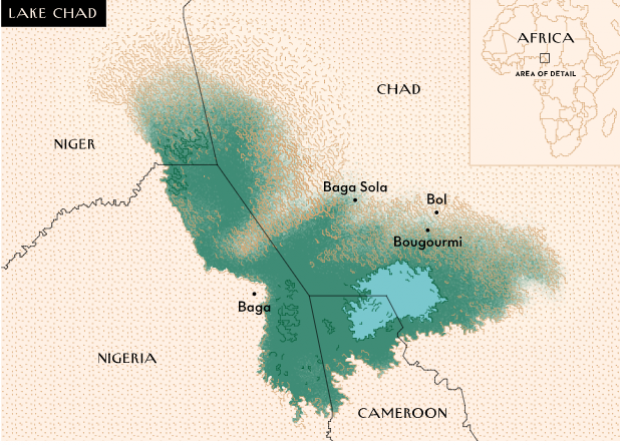A ray of hope for Lake Chad Basin
It seems things are truly looking up for the Lake Chad Basin. Some weeks ago, I stumbled on a missive signed by the Yobe State SSG, Baba Malam Wali, who was heading a committee to arrange the meeting of the Lake Chad Basin governors. My interest was roused because I had not seen such an […]

Lake Chad
It seems things are truly looking up for the Lake Chad Basin. Some weeks ago, I stumbled on a missive signed by the Yobe State SSG, Baba Malam Wali, who was heading a committee to arrange the meeting of the Lake Chad Basin governors. My interest was roused because I had not seen such an event for some time now, and I guessed that something momentous to the basin’s well-being was afoot. And it was.
The meeting was held in Maiduguri, at the tail end of last month and it brought together all the governors within the basin including the three within Nigeria, the northern part of Cameroun, The Republic of Chad, and the Niger Republic. Usually, such meetings are held under the auspices of the Lake Chad Basin Commission in its headquarters in N’Djamena, in the Republic of Chad but this forum is a special outfit for only the governors, started only in 2017 for them to focus on security and climate challenges facing the entire basin. The first such meeting was inaugurated in Maiduguri in 2017 and for reasons of inclusivity, the meeting now rotated between the member states.
Subsequently, further meetings were held in Niamey in 2019, Yaounde in 2021 and N’Djamena in 2023. It is the turn of Yobe State now to host the meeting and readers will agree with me that under the leadership of the governor, Mai Mala Buni, they have done a splendid job. The meeting was well attended. All the governors turned up with their traditional rulers alongside international development partners, representatives from local and international communities and others. The Vice President, representing President Bola Tinubu, came to the meeting with a handful of ministers, including the Chief of Defence Staff, General Christopher Musa. This year’s meeting like the previous ones addressed pressing security challenges and explored solutions for stability in the Lake Chad Basin region.
It was apt to send the Vice President to the meeting for he had been the governor of Borno State as well as the immediate past senator representing a large chunk of the state in the National Assembly. He is acquainted with the problems of the basin and has grappled with the solutions. Now he has his hands on the levers, to even do more. The security threats were uppermost in his mind and speaking at the meeting he stated, “Our response to these threats must be multifaceted. While military solutions are indispensable, they must be complemented by strategies that address the root causes of insecurity—poverty, inequality, and the lack of opportunities for our youth.”
- Why France can’t be Nigeria’s strategic partner (III)
- Addressing the urgent crisis of malnutrition in Northern Nigeria
All the governors and other attendees made similar speeches, suggesting this or that solution, but they were unanimous that the lake must be saved, and the insurgents must be cleared. For me looking back to past meetings, I could see similar exhortations, to enable the Lake Chad basin to return to the old days of prosperity.
From my perspective, that’s a tall task. Today the Lake Chad basin remains the most denuded of prosperity among all. Years of shrinking of the lake and years of insurgency have rendered the region comatose. This is despite the varied potentialities available within the basin.
The region has the largest concentration of livestock throughout Africa, and there are abundant oil deposits under the grounds, which we are yet to tap though our neighbours are already benefitting from it. On our side of the lake, for more than 60 years we have discovered the richness of the firgi soil, abundant in the basin, for cultivating rice and wheat in large commercial quantities, especially under irrigation. The Northern Nigerian Government started the South Chad Irrigation Pilot Project at Ngala in the early 1960s which was absorbed into the Chad Basin Development Authority (CBDA) when it came into existence in 1973.
I began my public service career at CBDA when it was in its heydays of the late 1970s and early 1980s. I can attest that the whole area between Maiduguri and Dikwa and Ngala and Maiduguri to Monguno to Kukawa and Baga was bustling with economic activities. You could say the same on the roads from Maiduguri to Biu through Damboa and Maiduguri to Bama to the border towns of Banki and Kirewa. Borno had some of the most beautiful road networks in the country.
In 1979 you could drive from Maiduguri to Gamboru-Ngala in under one hour, to Bama in 30 minutes to Damboa also in under one hour and similar times to Kukawa and Damasak.
Borno was the economic hub of the basin attracting all from Nigeria, and also from the neighbouring countries. Unfortunately, the destruction wrought by the Boko Haram insurgency put paid to all that. Now most of the infrastructure, particularly roads, is in dire straits. Most of the villages in northern Borno have been emptied. The CBDA I referred to above is a shell of itself having been pillaged over the years by the insurgents.
One wonders if anything substantial can be achieved without clearing the insurgents that are still active in pockets, here and there, on the lake and elsewhere. The task of returning prosperity to the Lake Chad basin is a tough one but I guess the governors are up to it. The fact that they meet to talk about the problems gives one hope.
